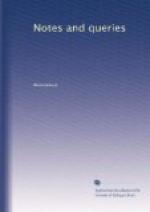C.H. COOPER.
Cambridge, 21st Jan. 1850.
* * * * *
PASSAGES FROM POPE.
In addition to the query of “P.C.S.S.” (No. 13. p. 201.), in which I take great interest, I would beg leave to ask what evidence there is that Quarles had a pension? He had, indeed, a small place in the household of James the First’s queen, Anne; and if he had a pension on her death, it would have been from James, not from Charles.
I would also, in reference to Pope, beg leave to propound another query.
In the “Imitation of the 2nd Sat. Book I. of Horace,” only to be found in modern editions, but attributed, I fear, too justly to Pope, there is an allusion to “poor E——s,” who suffered by “the fatal steel,” for an intrigue with a royal mistress. E——s is no doubt John Ellis, and the royal mistress the Duchess of Cleveland. (See Lord Dover’s Introduction to the “Ellis Correspondence,” and “Anecdotes of the Ellis Family,” Gent. Mag. 1769. p. 328.) But I cannot discover any trace of the circumstances alluded to by Pope. Yet Ellis was a considerable man in his day;—he had been Secretary to the Lord-Lieutenant of Ireland in the reign of Charles II., and was Under-Secretary of State under William III.; he is said to have afterwards sunk into the humbler character {246} of a “London magistrate,” and to have “died in 1788, at 93 or 95, immensely rich.” I should be glad of any clue to Pope’s allusion.
J.W.C.
Feb 12. 1850.
*
* * * *
“Worth makes the man,
and want of it the fellow;
The rest is all but leather
and prunello.”
Essay on Man, Epistle IV. 203.
Will your correspondent “P.C.S.S.” (No. 13), evidently a critical reader of Pope, and probably rich in the possession of various editions of his works, kindly inform me whether any commentator on the poet has traced the well-known lines that I have quoted to the “Corcillum est, quod homines facit, caetera quisquilia omnia” of Petronius Arbiter, cap. 75.? Pope had certainly both read and admired the Satyricon, for he says:—
“Fancy and art in gay
Petronius please,
The scholar’s learning
with the courtier’s ease.”
Essay on Criticism, sect. 3
I find no note on the lines either in the edition of Warton, 9 vols. 8vo., London, 1797, or in Cary’s royal 8vo., London, 1839; but the similarity strikes me as curious, and deserving further examination.
C. FORBES.
Temple.
* * * * *
BELVOIR CASTLE.
In Nichol’s History and Antiquities of the County of Leicester, vol. ii., part i., containing the Framland Hundred, p. 45 of the folio ed. 1795, occurs the following quotation, in reference to the rebuilding of Belvoir castle by Henry, second Earl of Rutland, in 1555:—




